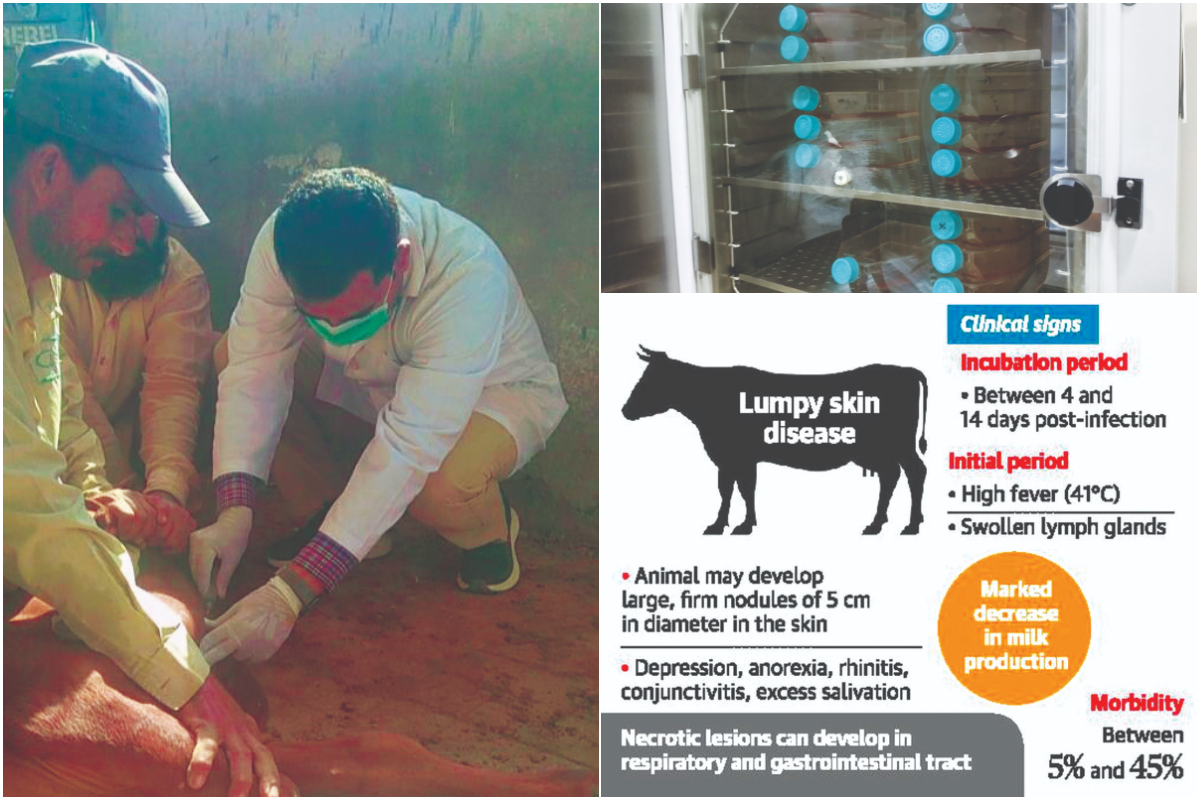
Local vaccine ready to combat lumpy skin
Ten times cheaper vaccine costs 25 rupees only
The Sindh Institute of Animal Health – a subsidiary of the Sindh Livestock Department, is all set to introduce the locally manufactured Lumpy Skin Disease Vaccine (LSDV) soon.
After completing all the tests and trials, the government would soon be approving the vaccine which will be available for as low as Rs 25 as compared to the Rs 250 imported one.
Benazir Kanwal, Deputy Director of Research at the Sindh Institute of Animal Health in Karachi, has apprised this scribe that in the process of vaccine preparation, samples of the LSDV were collected from all over the country and transported to the research lab of the institute where the virus was isolated using cell culture technique, and it was molecularly characterised and then sent through a passage in the Vero cells.
According to her, the vaccine is usually prepared with embryos or eggs, but this vaccine has been prepared by taking the real blood and organ of an animal, which will be effective for cattle infected with the virus. “Having prepared the live vaccine of LSD, successful trials were carried out on mice, rabbits and cattle. Now we are all set to launch the vaccine soon,” she added.

The other viruses usually cause disease by reproducing themselves many times in the body. Whereas natural viruses reproduce thousands of times during an infection, and vaccine viruses usually reproduce fewer than 20 times. However, the vaccine viruses replicate well enough to induce “memory B cells” that protect against infection in future. The advantage of live, “weakened” vaccines is that one or two doses provide immunity which is usually life-long.
Discussing the difficulties faced in the process, Kanwal told Bol News that gathering samples was indeed challenging. “To get samples from all over the country we travelled with the team; convincing the farmers to allow us to get their livestock samples. Initially, farmers were apprehensive in providing us samples out of fear of getting banned if positive cases were detected,” she informed, and added that when farmers got fully convinced that the process of collecting samples was not fishy, they started cooperating with us,” she said.
According to Dr Kanwal, importing the bulk of vaccines for cattle has been a challenge in the current economic conditions. It was Sindh that imported the vaccine for livestock and provided it to the farmers. However, Punjab has recently procured the vaccine while Baluchistan and Khyber Pakhtunkhwa are yet to acquire the vaccine. “We have planned to manufacture the doses as per the requirement of the country after calculation. We would be able to cater to the needs of the livestock of all the provinces,” she claimed.
According to Dr Nazir Hussain Kalhoro, Director General of the Sindh Institute of Animal Health, a nine-month mission was set up to develop a vaccine for the virus spreading in the cows in Sindh from the beginning of this year, and the target was achieved in five months. Presently, the Sindh Institute of Animal Health is through with the designing of bottles and labels, and soon the vaccine would hit the market. The Sindh government will purchase the vaccine and will provide it to the farmers of the province free of cost.
Dr Agha Waqar, ex-Director General National Veterinary Laboratory has appreciated the effort and said that if the vaccine achieves the targeted efficacy, it would be a big milestone. He stated that a similar assessment was conducted previously; however, the vaccination did not meet the needs in terms of efficacy. “I hope this vaccine achieves the anticipated outcomes. If this vaccine achieves the expected efficacy by fulfilling the international standards, it will certainly be a great success,” he opined.
Livestock production makes a major contribution to agricultural value-added services. It is a subsector of Pakistan agriculture which contributed approximately 62 per cent of value addition in agriculture and nearly 14 per cent to the gross domestic product (GDP) in 2021-22. More than eight million rural families in the country are engaged in livestock production in the country and are deriving around 35-40 per cent of their income from this sector.
According to the latest Economic Survey of Pakistan, the sector’s gross value addition has increased by 3.26 per cent in a year, rising from Rs5.269 trillion to Rs5.441 trillion in 2021-22.
Dr Waqar has pointed out that livestock is of great importance in Pakistan and measures to protect it are indispensable. The initial cost to upgrade the LSVD for the entire country was around two billion rupees. “A locally made vaccine would bring the cost down. This will greatly benefit not just the government, but also the farmers”, he said.
Catch all the Urban Insight News, Breaking News Event and Latest News Updates on The BOL News
Download The BOL News App to get the Daily News Update & Live News.












 Read the complete story text.
Read the complete story text. Listen to audio of the story.
Listen to audio of the story.